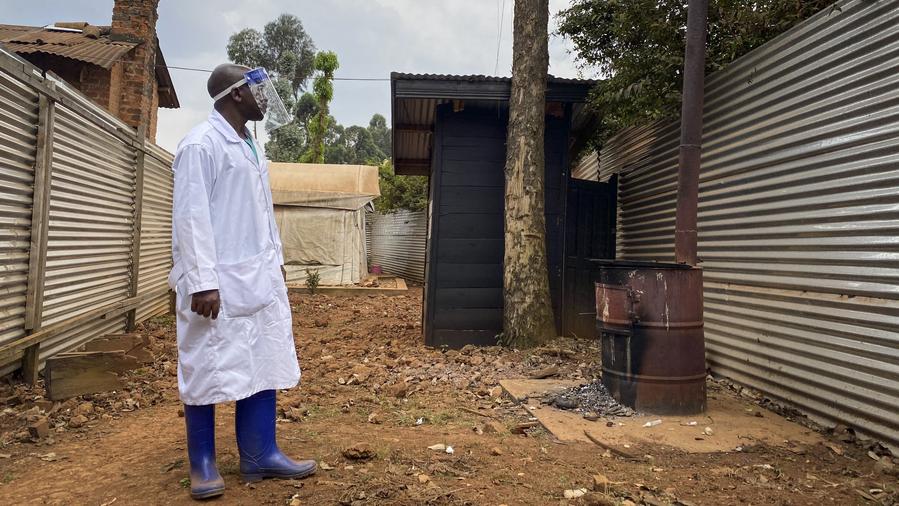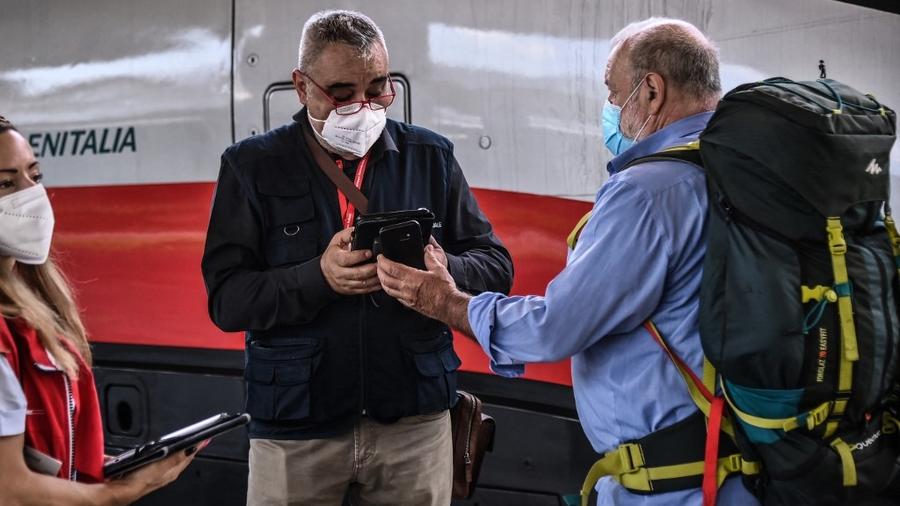 A medical worker checks the quarantine area of the Matanda Hospital in Butembo, where the first case of Ebola died, in the North Kivu province of Congo on Feb. 11, 2021. (AL-HADJI KUDRA MALIRO / AP)
A medical worker checks the quarantine area of the Matanda Hospital in Butembo, where the first case of Ebola died, in the North Kivu province of Congo on Feb. 11, 2021. (AL-HADJI KUDRA MALIRO / AP)
ROME / TUNIS / KINSHASA- The Democratic Republic of the Congo has confirmed a new Ebola case in the northeastern part of the country even as COVID-19 continued to ravage the country.
DRC officials confirmed late Friday that a three-year-old boy died of Ebola on Wednesday in Beni, in the northeastern North Kivu province, an epicenter of the last Ebola outbreak that ended on May 3.
The Democratic Republic of Congo is still one of the 50 countries across the world that have failed to fully vaccinate 10 percent of their population against coronavirus
A "new resurgence of Ebola virus" has taken place in the Beni health zone, Health Minister Jean-Jacques Mbungani said in a statement during the day, without specifying a possible resurgence of the Ebola outbreak.
"WHO is working with the government of DRC on the investigation of a case of Ebola in North Kivu," the World Health Organization chief Tedros Adhanom Ghebreyesus tweeted Saturday.
A total of 12 cases, including six deaths, have been reported since the last Ebola outbreak, which was declared on Feb 7 . The cases were genetically linked to the 2018-2020 outbreak that killed more than 2,200 people in eastern DRC, the second deadliest on record.
As for the new case, about 100 people possibly exposed to the virus have been identified and will be monitored for any relevant symptom, said Mbungani.
"North Kivu has been battered by Ebola outbreaks during the past few years, but this has built up local expertise and community awareness, paving the way for a fast-moving response," tweeted Matshidiso Moeti, WHO's regional director for Africa.
Meanwhile, the COVID-19 pandemic is still ravaging the country. Since the declaration of the pandemic in March 2020, DRC has reported more than 57,000 cases, including 1,086 deaths, said Mbungani in a briefing Friday in Kinshasa.
Due to the high transmission of the Delta variant in the DRC, numerous European countries including France and Belgium have classified the African country as the "red zone."
The DRC is still one of the 50 countries across the world that have failed to fully vaccinate 10 percent of their population against coronavirus, a target set by the WHO. So far, only about 0.1 percent of the country's 89 million people have had one dose of COVID-19 vaccine.
Africa
The number of confirmed COVID-19 cases in Africa reached 8,371,723 as of Friday afternoon, the Africa Centers for Disease Control and Prevention said.
The Africa CDC, the specialized healthcare agency of the African Union, said the death toll from the pandemic across the continent stands at 213,425.
Some 7,720,490 patients across the continent have recovered from the disease so far.
South Africa, Morocco, Tunisia and Ethiopia are among the countries with the most cases in the continent, according to the agency.
ALSO READ: CDC: Africa faces major challenges in securing vaccines
In terms of the caseload, southern Africa is the most affected region, followed by the northern and eastern parts of the continent, while central Africa is the least affected region in the continent, according to the Africa CDC.
Italy
Italy on Saturday began administering booster shots of COVID-19 vaccines to people over the age of 60, a day after the procedure was authorized by the Health Ministry.
The decision followed the official green light earlier this month by the European Medicines Agency, which stated the booster shot could be considered for all people over 18 after six months from their second dose.
Italy's decision followed the official green light earlier this month by the European Medicines Agency, which stated the booster shot could be considered for all people over 18 after six months from their second dose
"In the light of EMA's latest deliberation, we can go ahead with the third vaccine dose to people of all ages with a fragile immune system and to all people over 60, always six months after the second dose," the Italian ministry said.
In late September, Italy had started administering third doses -- of either Pfizer/BioNTech or Moderna vaccines -- to immuno-compromised people such as transplant patients, elderly people over 80 and residents in care homes, and healthcare workers.
The third dose will be offered as an option, since vaccination against coronavirus remains strongly recommended but not mandatory in Italy.
ALSO READ: WHO studies evidence of virus antibodies found in Italy in 2019
Meanwhile, the pandemic situation appeared "under control," and the curve of coronavirus cases kept decreasing gradually, according to the latest weekly monitoring by the country's National Health Institute updated to Oct 3.
The incidence stood at 34 cases per every 100,000 inhabitants. The data for hospital bed occupancy were also encouraging, according to Giovanni Rezza, Director of the Infectious Diseases Department at the ISS.
"We register a 4.9 percent and 4.2 percent of bed occupancy in normal COVID-19 wards and intensive care units, respectively, which is well below the critical thresholds," Rezza explained in a video statement.
So far, the vaccination campaign in Italy has reached 79.9 percent of the target population (over 12), with over 43 million people fully immunized, official data showed.
To date, Italy has registered over 4.6 million COVID-19 cases, including more than 131,000 deaths, and over 4.4 million recoveries.
 An inspector (left) checks a passenger boarding a high-speed "Frecciarossa" train, for his so-called Green Pass on Sept 1, 2021 at the Porta Nuova railway station in Turin. Since early August, Italy has required proof of vaccination, recent recovery from coronavirus or a negative test for people wanting to dine indoors or enter museums and sports events.
(MARCO BERTORELLO / AFP)
An inspector (left) checks a passenger boarding a high-speed "Frecciarossa" train, for his so-called Green Pass on Sept 1, 2021 at the Porta Nuova railway station in Turin. Since early August, Italy has required proof of vaccination, recent recovery from coronavirus or a negative test for people wanting to dine indoors or enter museums and sports events.
(MARCO BERTORELLO / AFP)
Tunisia
Since the start of the national vaccination campaign on March 13, a total of 4,014,524 Tunisians have been fully vaccinated against COVID-19, the Tunisian Health Ministry said on Saturday.
The total number of people registered on the electronic vaccination platform Evax amounted to 6,432,778, said the ministry.
According to the latest figures released by the health ministry, 234 new COVID-19 cases were reported, raising the tally in the North African country to 709,456.
The death toll from the virus rose by two to 24,996 in Tunisia, while the total number of recoveries reached 681,539, the ministry said.
A total of 2,985,601 lab tests have been carried out in Tunisia so far.
UK
The UK government bought 100,000 doses of GlaxoSmithKline Plc’s COVID-19 antibody drug Sotrovimab, the Telegraph reported on Saturday, in order to boost the nation’s range of treatments in the event of new virus variants emerging. Antibody treatments can prevent COVID-19 patients from becoming severely ill.
Sotrovimab is yet to be approved by UK regulators and the deal is subject to approval, the newspaper said.
US
The US gave more than 7 million vaccine doses in the last week, the most since early July. The increase has been driven in part by the demand for booster shots. Of the 1.15 million doses reported on Saturday, boosters made up 502,000, Cyrus Shahpar, the White House’s COVID-19 data director, tweeted.
Demand has been rising steadily since third Pfizer doses have become more widely available in the last two weeks, according to the Bloomberg Vaccine Tracker. The US has given 7.79 million third doses since they became available to the medically vulnerable in mid-August, according to data from the Centers for Disease Control and Prevention.
ALSO READ: US virus deaths top 1918 flu estimates
Average daily vaccinations have fallen from a peak of more than 3.3 million doses in mid-April to about 1 million now.
Zambia
The relaunch of the COVID-19 vaccination campaign program in Zambia confirms that misinformation is still a big problem for people to accept the vaccines.
On Thursday, President Hakainde Hichilema relaunched the vaccination campaign in a bid to encourage more people to get vaccinated.
The relaunch of the campaign is also in anticipation of the third wave expected to hit the country toward the end of this year into 2022.
Since the first launch of the vaccination program on April 14, 2021, only about 5 percent of the eligible population have so far been vaccinated.
With the relaunched campaign, the government is targeting to vaccinate 8.4 million eligible people aged 18 and above, or 70 percent of the eligible population.
According to the Zambian president, having people vaccinated is critical if the fight against the pandemic is to succeed.
"As we relaunch the COVID-19 vaccination campaign, we call upon all Zambians to rise up and join hands in taking full responsibility and control in fighting the Coronavirus pandemic," he said.
While the government believes that the vaccination program remains key to the fight against the pandemic, some people are still skeptical about the vaccines mainly due to conspiracy theories that have been peddled and have stuck in people's minds.
The Zambian president acknowledged that many people have been hesitant to take the vaccine because of lack of adequate information on the safety and effectiveness of the vaccine.
Random interviews conducted in Lusaka, the country's capital, to establish why people do not want to be vaccinated have revealed that people still have a lot of misconceptions about the vaccines despite repeated awareness programs by health authorities.


